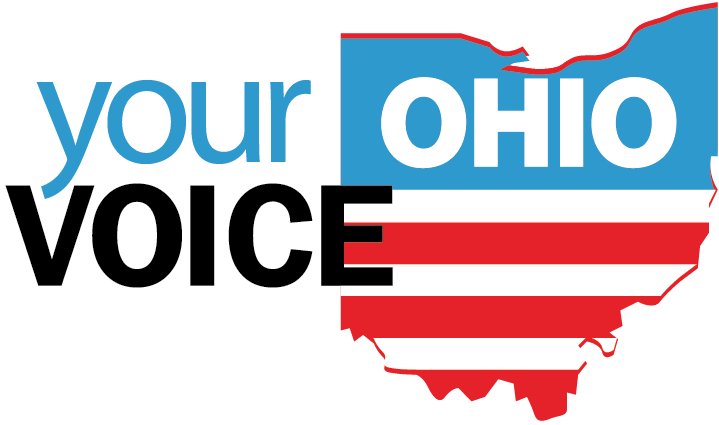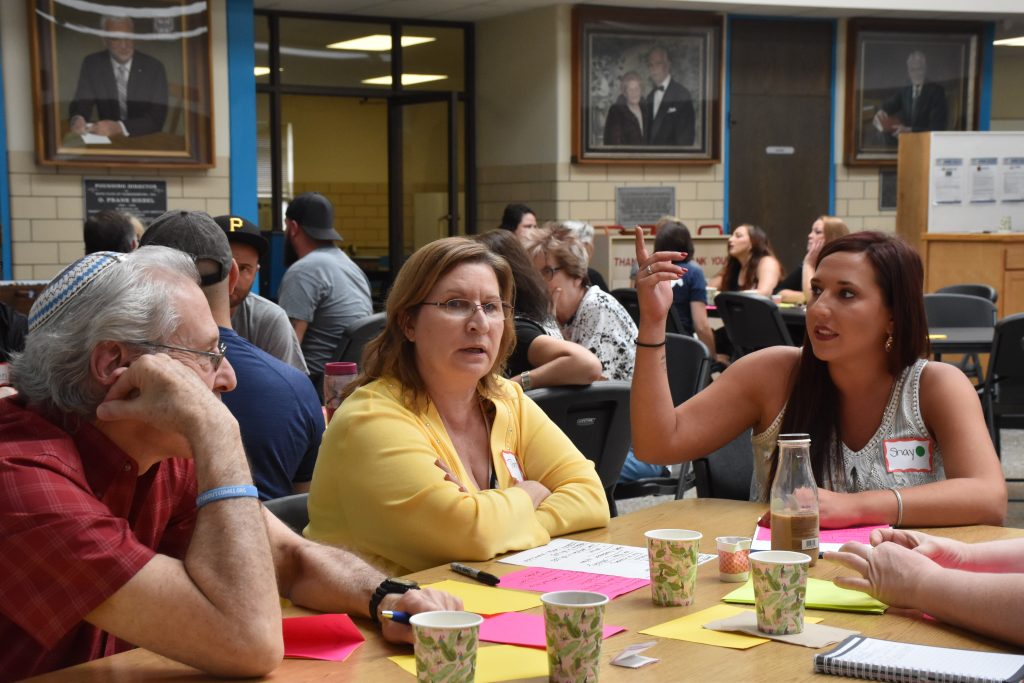Earlier this week, journalists from Clutch MOV online news, the Marietta Times, Newstalk 910 WLTP, the Ohio Valley ReSource National Public Radio collaborative, Parkersburg News and Sentinel, WOUB public radio at Ohio University, WMOA, WTAP-TV, and WPKM, met with almost 150 community members to discuss solutions to the addiction crisis in the Mid-Ohio Valley.
In Ohio and West Virginia alone, where the Valley is situated, opioids and addiction are killing 5,000 people a year. At the forums, people echoed what we’ve heard before in our conversations around the state: addiction has a massive impact on families, the stagnant economy and sense of hopelessness plays a role in addiction, and there’s a dire need for more recovery services. But we also heard something that differed from our other meetings: a sense that the Mid-Ohio Valley had been targeted and exploited by the pharmaceutical industry and medical community.
After a few hours of discussing local solutions to addiction with their neighbors, attendees left with a sense of hope for the future. Patrice Pooler, Executive Director/CEO of the Mid-Ohio Valley Fellowship Home, told the Marietta Times, “I think it was awesome that we had a chance to ask the questions and look for solutions and have it be a community effort,” she said. “We should do this more often. Recovery matters and we do have the ability to be part of the solution as a community.”
Parkersburg
At our first event in Parkersburg, almost half of the people who attended were in recovery, and many returned to share their stories in Belpre the next evening as well. One community organizer said there was a feeling of being heard and respected–which can be rare for people who have struggled with substance use. Rich Walters, an Addiction Treatment Specialist, told the Marietta Times that it’s time for communities to consider multiple, and perhaps unconventional, pathways to recovery. He emphasized recovery won’t look the same for everyone.
Many communities members also agreed that addiction has completely changed the town they remembered growing up in, especially as jobs became harder to find and pills were easy to come by. Their pain, loss, and sense of hopelessness became a money-making industry, and once trapped in that cycle, it became hard to get out. Attendees also pointed to technology, saying our cellphones can isolate people, easily connect them to drugs, provide an escape from reality, and distract kids in school from drug education initiatives. When asked to consider local ways to address these issues, they wanted to see drug use treated as an illness rather than a crime, and more reporting on the success stories of people in recovery.
Belpre
In Belpre, doctors, business people, volunteers, residents, and people in recovery also recognized how the crisis affects absolutely everyone in the community. While many of the attendees had not personally experienced addiction, they wanted to increase their personal understanding of the crisis. One retiree said at the beginning she knew nothing about addiction, repeatedly expressed “Oh-my” moments during the conversation, and at the end observed that causes and solutions are complex.
Two mothers, who originally wanted to stand on the edge of the conversation, were encouraged to join the tables. Once they did so, they shared the stories of their children struggling with addiction, which brought home the stress on families and the need for family support. People also discussed the financial and emotional cost to community services, particularly first responders, hospital emergency rooms, and social services. When thinking about solutions the community could take, they wanted to see an increase in early education techniques, not limited to substance use education, but focused on coping skills that could help children deal with trauma so they don’t turn to drugs. They also wanted to make information about recovery resources more available to people affected by addiction, for both substance users themselves and their families.
Marietta
Our final conversation in Marietta drew local judges, candidates, probation officers, lawyers, people in recovery and their families, teachers, and medical professionals. One woman in recovery spoke face-to-face with a Washington County common pleas judge about the need for recovery specialists to work alongside members of the drug court. Another expressed concern about her inability to support her son as he returned from prison–who was available to help him stay away from drugs, establish relationships and find work? Echoing her sentiment, several people identified with the struggle to find work with a non-violent felony in their past. Similar to other events, they also wanted to see substance abuse education at an early age. One healthcare professional noted that in Marietta, the age of first use is 13-14. Initiatives to increase this statistic, even if only by a few years, could significantly reduce the risk of long-term addiction for youth.
After two hours in tight quarters, people spilled into the parking lot and talked for sometimes a half hour, hugging and encouraging one another.
One attendee left the meeting saying, “I learned how much our community cares about each other and the future of our community. We all can and are willing to fix this.”
What’s next for the Mid-Ohio Valley?
Reporters are now researching questions about addiction from the community, and we’ll share what they find on our site and in our weekly newsletter.
If you’re wondering what solutions are working in other communities to confront opioids and addiction, check out our solutions library. You can also view our list of community specific addiction and recovery resources. To follow our new research and research of our local media partners, sign up for our weekly news roundup.






I want to share Shatterproof (Shatterproof.org) with you too, a national non-profit dedicated to ending the devastation of addiction through federal and state advocacy, public education, payer reform, provider ratings and provider education. The website is an excellent resource. The Shatterproof Rise Up Against Addiction 5k Run/Walk series (shatterproof5k.org) is the largest in the nation with an addiction focus, providing community and camaraderie while ending the stigma of this disease.